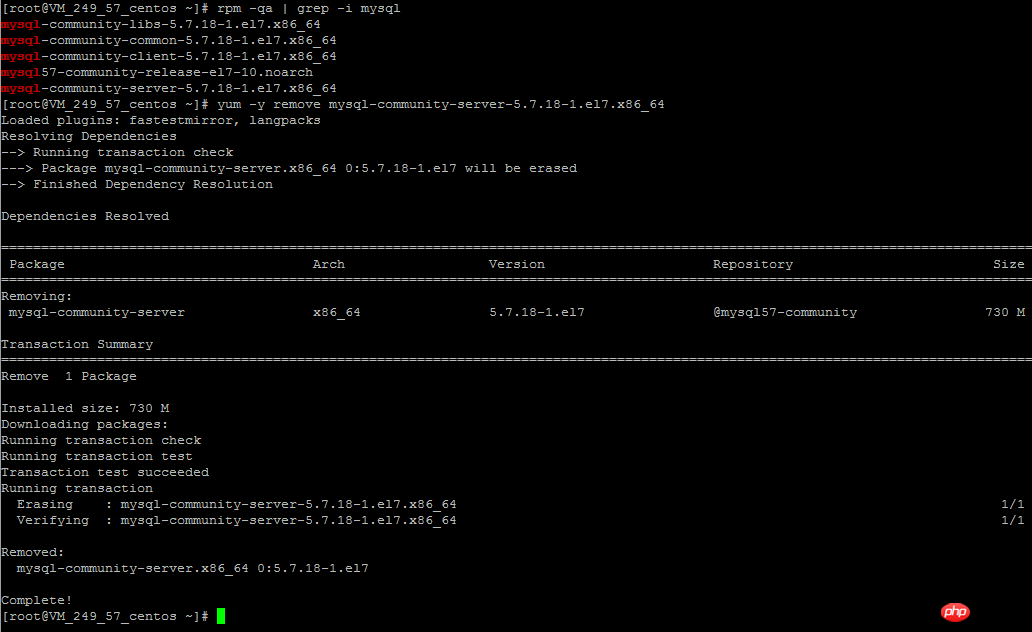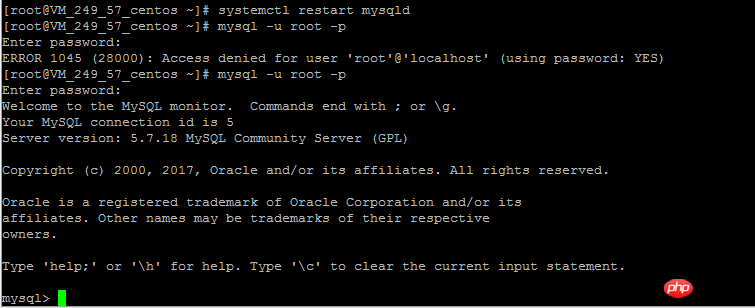 Database
Database
 Mysql Tutorial
Mysql Tutorial
 Detailed graphic and text explanation of MySQL5.7.18 yum method from uninstallation to installation under Linux
Detailed graphic and text explanation of MySQL5.7.18 yum method from uninstallation to installation under Linux
Detailed graphic and text explanation of MySQL5.7.18 yum method from uninstallation to installation under Linux
Finally figured out the yum installation process. I have written binary package installation before. Here I use yum to install it. The environment is the same, Centos7.2+MySQL5.7.18. This article mainly introduces MySQL5.7.18 yum under Linux. The method is illustrated from uninstallation to installation. Friends who need it can refer to it. I hope it can help everyone.
Each step refers to many articles, which will be listed one by one later. Because this machine has already been installed, simply follow the steps step by step to uninstall and then reinstall.
This article is implemented through a series of relatively copycat methods. For users like me who have not been exposed to Linux for a long time, it is relatively easy to understand and accept. For example, download the file directly under Windows and drag it to the Linux system. Instead of downloading with wget command, edit directly through the editing function of winscp editor instead of vim command.
Uninstall
Operating system version

rpm -qa | grep -i mysql rpm -qa | grep -i mysql命令查看已经安装过的组件。

Use the yum -y remove command to uninstall the installed MySQL components. Use the following command to uninstall the ones installed above separately.
yum -y remove mysql-community-libs-5.7.18-1.el7.x86_64 yum -y remove mysql-community-common-5.7.18-1.el7.x86_64 yum -y remove mysql-community-client-5.7.18-1.el7.x86_64 yum -y remove mysql57-community-release-el7-10.noarch yum -y remove mysql-community-server-5.7.18-1.el7.x86_64
There will be no more pictures Take a screenshot and take an example.

Use rpm -qa | grep -i mysql again to view the installed components. They have been completely uninstalled.

Whereis MySQL queries the directories generated by previous installation and remove them respectively.

Installation
Download the MySQL repo source. As for what this file does, my personal understanding is to automatically configure the yum source of the MySQL installation component for you. of.
This file can be downloaded under Windows and then uploaded to the Linux server. It can also be downloaded directly from the Linux server. It also needs to be installed.

After downloading this file, drag it to the root directory of the Linux server through winscp

Download the above under Linux The file

Install the MySQL repo package
rpm -ivh mysql57-community-release-el7-10.noarch.rpm

There will be some simple prompts in the middle. After entering Y, Everything is installed fully automatically.
yum install mysql-community-server

Installation completed

Modify Root initial password
After installation, it will be generated under etc A my.cnf file, add a skip-grant-tables = 1 configuration to my.cnf to skip the initial password verification requirement.

Systemctl starts the mysql service

Connect to the MySQL service, because it is configured to skip the password requirement, enter mysql - Press enter after u -p, and continue to press enter when prompted to enter the password to connect to mysql.

Modify the MySQL Root password
update user set authentication_string=PASSWORD('newpassword') where User='root';
Use this statement to modify the root user for remote access, update user set host = '%' where user = 'root'


MySql5.7.18 character set configuration graphic example sharing
Centos7.3 installation mysql5.7.18 rpm tutorial
About centos6.4 mysql5.7.18 installation and configuration method graphic tutorial sharing
The above is the detailed content of Detailed graphic and text explanation of MySQL5.7.18 yum method from uninstallation to installation under Linux. For more information, please follow other related articles on the PHP Chinese website!

Hot AI Tools

Undresser.AI Undress
AI-powered app for creating realistic nude photos

AI Clothes Remover
Online AI tool for removing clothes from photos.

Undress AI Tool
Undress images for free

Clothoff.io
AI clothes remover

Video Face Swap
Swap faces in any video effortlessly with our completely free AI face swap tool!

Hot Article

Hot Tools

Notepad++7.3.1
Easy-to-use and free code editor

SublimeText3 Chinese version
Chinese version, very easy to use

Zend Studio 13.0.1
Powerful PHP integrated development environment

Dreamweaver CS6
Visual web development tools

SublimeText3 Mac version
God-level code editing software (SublimeText3)

Hot Topics
 1393
1393
 52
52
 1207
1207
 24
24
 What computer configuration is required for vscode
Apr 15, 2025 pm 09:48 PM
What computer configuration is required for vscode
Apr 15, 2025 pm 09:48 PM
VS Code system requirements: Operating system: Windows 10 and above, macOS 10.12 and above, Linux distribution processor: minimum 1.6 GHz, recommended 2.0 GHz and above memory: minimum 512 MB, recommended 4 GB and above storage space: minimum 250 MB, recommended 1 GB and above other requirements: stable network connection, Xorg/Wayland (Linux)
 vscode cannot install extension
Apr 15, 2025 pm 07:18 PM
vscode cannot install extension
Apr 15, 2025 pm 07:18 PM
The reasons for the installation of VS Code extensions may be: network instability, insufficient permissions, system compatibility issues, VS Code version is too old, antivirus software or firewall interference. By checking network connections, permissions, log files, updating VS Code, disabling security software, and restarting VS Code or computers, you can gradually troubleshoot and resolve issues.
 How to run java code in notepad
Apr 16, 2025 pm 07:39 PM
How to run java code in notepad
Apr 16, 2025 pm 07:39 PM
Although Notepad cannot run Java code directly, it can be achieved by using other tools: using the command line compiler (javac) to generate a bytecode file (filename.class). Use the Java interpreter (java) to interpret bytecode, execute the code, and output the result.
 What is vscode What is vscode for?
Apr 15, 2025 pm 06:45 PM
What is vscode What is vscode for?
Apr 15, 2025 pm 06:45 PM
VS Code is the full name Visual Studio Code, which is a free and open source cross-platform code editor and development environment developed by Microsoft. It supports a wide range of programming languages and provides syntax highlighting, code automatic completion, code snippets and smart prompts to improve development efficiency. Through a rich extension ecosystem, users can add extensions to specific needs and languages, such as debuggers, code formatting tools, and Git integrations. VS Code also includes an intuitive debugger that helps quickly find and resolve bugs in your code.
 Can vscode be used for mac
Apr 15, 2025 pm 07:36 PM
Can vscode be used for mac
Apr 15, 2025 pm 07:36 PM
VS Code is available on Mac. It has powerful extensions, Git integration, terminal and debugger, and also offers a wealth of setup options. However, for particularly large projects or highly professional development, VS Code may have performance or functional limitations.
 How to use VSCode
Apr 15, 2025 pm 11:21 PM
How to use VSCode
Apr 15, 2025 pm 11:21 PM
Visual Studio Code (VSCode) is a cross-platform, open source and free code editor developed by Microsoft. It is known for its lightweight, scalability and support for a wide range of programming languages. To install VSCode, please visit the official website to download and run the installer. When using VSCode, you can create new projects, edit code, debug code, navigate projects, expand VSCode, and manage settings. VSCode is available for Windows, macOS, and Linux, supports multiple programming languages and provides various extensions through Marketplace. Its advantages include lightweight, scalability, extensive language support, rich features and version
 What is the main purpose of Linux?
Apr 16, 2025 am 12:19 AM
What is the main purpose of Linux?
Apr 16, 2025 am 12:19 AM
The main uses of Linux include: 1. Server operating system, 2. Embedded system, 3. Desktop operating system, 4. Development and testing environment. Linux excels in these areas, providing stability, security and efficient development tools.
 How to check the warehouse address of git
Apr 17, 2025 pm 01:54 PM
How to check the warehouse address of git
Apr 17, 2025 pm 01:54 PM
To view the Git repository address, perform the following steps: 1. Open the command line and navigate to the repository directory; 2. Run the "git remote -v" command; 3. View the repository name in the output and its corresponding address.



